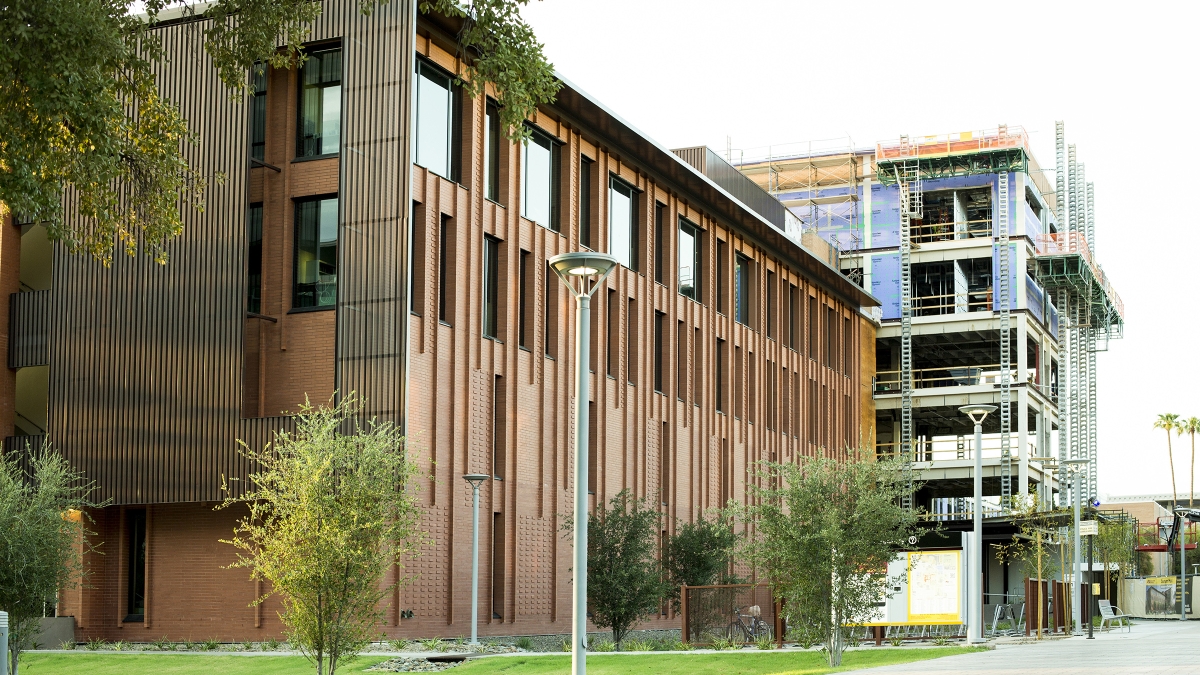ASU Humanities Lab teams up with School of International Letters and Cultures

The newly renovated Durham building, still undergoing renovations in the south wing, is home to the School of International Letters and Cultures. Photo by Maureen Kobierowski
Arizona State University's Humanities Lab and the School of International Letters and Cultures have announced the Humanities Lab’s new administrative affiliation as part of the School of International Letters and Cultures collective.
The Humanities Lab, launched on ASU’s Tempe campus in fall 2017, is an academic initiative that offers students team-taught, problem-focused, humanities-based interdisciplinary courses designed to produce collaborative exploratory learning experiences and outcomes. All labs tackle pressing social challenges that afflict our world today, issues ranging from the future of cars to energy justice in the Navajo Nation, from food sovereignty to dismantling ableism, from human land use in the Amazon and Arizona to the protection of biological and linguistic diversity.
Coming together as part of the school's collective is synergistic. The School of International Letters and Cultures and the Humanities Lab are aligned in their missions to help students become globally informed citizens in a world of complex challenges.
“This affiliation comes at an ideal time when the Humanities Lab and (the school) are experiencing accelerated growth and interest as the pandemic reveals the depth of global inequities as well as the urgency of transnational communication and collaboration,” Humanities Lab Co-director Juliann Vitullo said.
School of International Letters and Cultures Director and longtime supporter Nina Berman expressed her praise for the partnership: “The Humanities Lab is a highly dynamic incubator for innovative teaching at ASU. (The school) is very excited to become the home for the lab, which has been a true trailblazer, both in terms of the content of the courses offered as well as experimental pedagogies.”
Since its early inception, the Humanities Lab has partnered with the School of International Letters and Cultures to bring international perspectives into the lab experience. Collaborations include labs such as: "Re-Envisioning Food Systems" and "Facing Immigration" (fall 2018), "Facing Immigration II" (spring 2019), "Why is the Amazon Burning?" and "Only English?" (fall 2020), and "Sustainable Fashion" and "Information Overload" (coming spring 2021).
The fall 2020 labs Why is the Amazon Burning? and Only English? will be the first School of International Letters and Cultures cross-listed labs to kick off under the affiliation. Both labs continue the practice of bringing individuals and community partners from around the globe into their classroom experiences via Zoom and social media.
International study abroad programming is another space in which the two partners see the opportunity to grow together in a significant way.
Some of this had already begun to evolve organically with a collaborative research project and the creation of a new study abroad program developed by faculty team Christiane Reves, from the School of International Letters and Cultures and Sujey Vega, from the School of Social Transformation. Reves and Vega had designed a research project and summer 2020 study abroad experience comparing migration in Berlin and Phoenix as a new project stemming from their 2018 Humanities Lab "Facing Immigration I."
The School of Social Transformation was the inaugural home of the Humanities Lab because of the school’s focus on social justice. The school’s faculty have played and continue to play an important role in the creation of new Humanities Labs.
“The (schools') collaboration is an excellent example of ASU’s commitment to interdisciplinary rigor and creativity,” said Heather Switzer, from the School of Social Transformation and Humanities Lab co-director.
In addition to the School of International Letters and Cultures and the School of Social Transformation, the Humanities Lab currently collaborates with 12 colleges and schools from across all ASU campuses. Vitullo and Switzer invite and welcome exciting and interesting ideas for labs that address urgent social challenges from faculty from across all of ASU’s disciplines and programs.
Both the School of International Letters and Cultures and the Humanities Lab welcome students of all levels — both undergraduate and graduate — and from varying cultural and disciplinary backgrounds to participate in their programs and contribute to the creation of innovative approaches to making a better and more inclusive world.
“Since both (the School of International Letters and Cultures) and the Humanities Lab deeply value bridging cultural gaps as much as historical and cultural contexts, this merger is a very natural fit and we are quite pleased to have been able to bring this affiliation to fruition,” Berman said.
More Arts, humanities and education

School of Social Transformation faculty member assumes new title with NSF
School of Social Transformation faculty member and Founding Executive Director of the Center for Gender Equity in Science…

ASU's Neal Lester reflects on life, death of poet Nikki Giovanni
When Neal Lester heard on Monday that poet and activist Nikki Giovanni had died, the news hit hard.Lester, the founding director…

Learning by stepping outside
By Adriana MaestasAmid a world increasingly captivated by all things digital, more than 200 Arizona teachers have crafted…